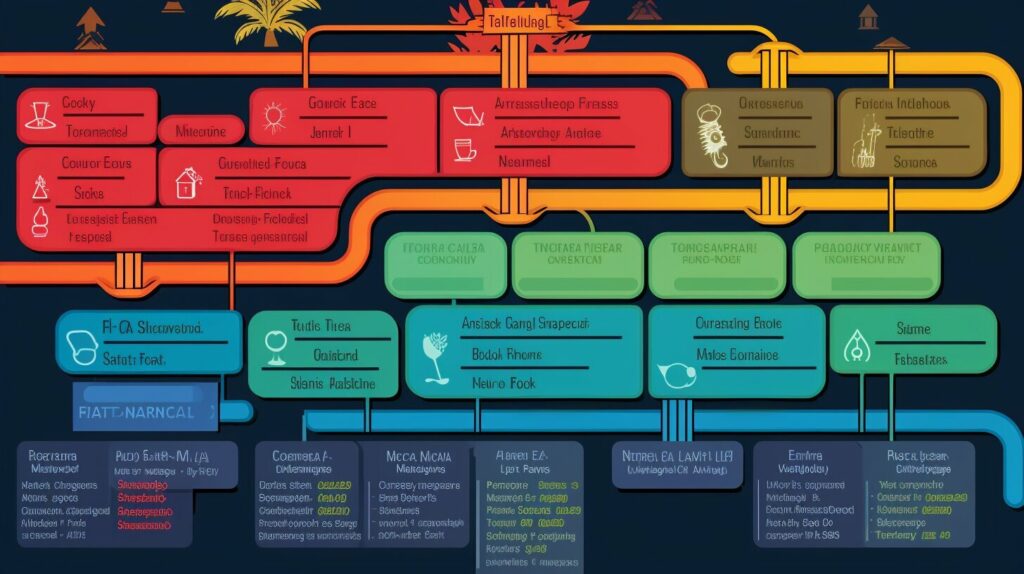At the forefront of property financing in Costa Rica, GapInvestments.com stands as a beacon for…

Understanding Taxes for Expats in Costa Rica: A Detailed Guide
Taxes for expats in Costa Rica can be complex, but with the right knowledge and guidance, you can navigate the system and ensure compliance with ease. It is crucial for US citizens living in Costa Rica to understand their tax obligations. Even if you reside in Costa Rica, you must file a US tax return. In Costa Rica, residents are required to pay taxes on worldwide income. The country has a simple tax system with relatively low rates, but it is essential to be aware of the different types of income and their corresponding tax rates.
Alongside income tax, there are other taxes in Costa Rica that expats need to consider. These include property tax, property transfer tax, value-added tax, and corporate tax. Understanding how these taxes apply to your situation is vital to stay compliant and avoid any penalties.
It is worth noting that currently, there is no tax treaty or totalization agreement between the United States and Costa Rica. This means that US expats in Costa Rica may be subject to double taxation. To optimize your tax obligations and avoid unnecessary financial burdens, seeking professional tax advice is highly recommended.
- US citizens living in Costa Rica must file a US tax return.
- Costa Rican residents are required to pay taxes on worldwide income.
- Costa Rica has a simple tax system with relatively low rates.
- Different types of income have varying tax rates.
- Other taxes in Costa Rica include property tax, property transfer tax, value-added tax, and corporate tax.
Costa Rica’s Tax System and Requirements for Expats
As an expat living in Costa Rica, understanding the country’s tax system and meeting the applicable requirements is crucial to ensure compliance and minimize any potential tax liabilities. Costa Rica operates on a worldwide taxation basis, meaning that residents are required to pay taxes on their global income. This includes income earned both within Costa Rica and from foreign sources. Therefore, it’s important to accurately report all sources of income on your tax return.
Costa Rica has a relatively simple tax system with progressive tax rates ranging from 0% to 25%. The tax rates vary depending on the type of income, such as employment income, business income, rental income, or investment income. It’s essential to understand the specific tax rates applicable to each category of income to accurately calculate and pay your taxes.
In addition to income tax, there are other taxes in Costa Rica that expats should be aware of. These include property tax, property transfer tax, value-added tax (VAT), and corporate tax. Property tax is levied on the assessed value of properties, while property transfer tax is applicable when buying or selling real estate. VAT is a consumption tax applied to most goods and services, while corporate tax is imposed on Costa Rican companies.
| Tax Type | Tax Rate |
|---|---|
| Income Tax | 0% – 25% |
| Property Tax | Varies (based on assessed value) |
| Property Transfer Tax | 1.5% – 3% |
| Value-Added Tax (VAT) | 13% |
| Corporate Tax | 30% |
It’s important to note that there is currently no tax treaty or totalization agreement between the United States and Costa Rica. This means that US citizens living in Costa Rica may be subject to double taxation, being required to pay taxes both in Costa Rica and to the US government. To navigate the complexities of international taxation and ensure compliance, it is highly recommended to consult with tax professionals who specialize in expat tax services. They can provide personalized advice and help you optimize your tax obligations.

In summary, understanding the tax system and requirements for expats in Costa Rica is essential to avoid any legal or financial consequences. Be sure to stay informed about the tax rates, different types of taxes, and any changes in tax regulations. Seeking guidance from tax professionals can provide peace of mind and ensure that you fulfill your tax obligations while maximizing the benefits available to you.
Conclusion
Navigating taxes as an expat in Costa Rica can be challenging, but with the help of experts and proper tax planning, you can ensure compliance and make the most of your financial situation while enjoying your life in this beautiful country.
Understanding the tax requirements for expats in Costa Rica is crucial to avoid penalties and maximize benefits. As a US citizen living in Costa Rica, it’s important to note that you are still obligated to file a US tax return, even if you earn income solely in Costa Rica. Costa Rica follows a worldwide income taxation system, which means residents are required to pay taxes on their income from both domestic and foreign sources.
The good news is that Costa Rica has a simple tax system with relatively low tax rates. Different types of income, such as salary, rental income, and investment income, are subject to varying tax rates. Additionally, Costa Rica imposes other taxes, such as property tax, property transfer tax, value-added tax, and corporate tax. It is crucial to understand these taxes and fulfill your obligations accordingly.
It’s important to note that there is currently no tax treaty or totalization agreement between the United States and Costa Rica. This means that as an expat, you may be subject to double taxation on your income. To navigate the complexities of the tax system effectively, seeking the assistance of expat tax services in Costa Rica is highly recommended. These professionals can provide personalized advice and help you optimize your tax situation, ensuring compliance and minimizing your tax liability.
FAQ
Q: Do US citizens living in Costa Rica need to file a US tax return?
A: Yes, US citizens must file a US tax return even if they live in Costa Rica.
Q: Are residents in Costa Rica required to pay taxes on worldwide income?
A: Yes, residents in Costa Rica are required to pay taxes on worldwide income.
Q: How does Costa Rica’s tax system work?
A: Costa Rica has a simple tax system with relatively low rates. Different types of income have varying tax rates.
Q: What are some other taxes in Costa Rica?
A: Other taxes in Costa Rica include property tax, property transfer tax, value-added tax, and corporate tax.
Q: Is there a tax treaty between the US and Costa Rica?
A: Currently, there is no US-Costa Rica tax treaty or totalization agreement, which may result in potential double taxation for expats.
Q: Should I consult with tax professionals for personalized advice?
A: Yes, it is recommended to consult with tax professionals who specialize in expat taxes for personalized advice and assistance.


